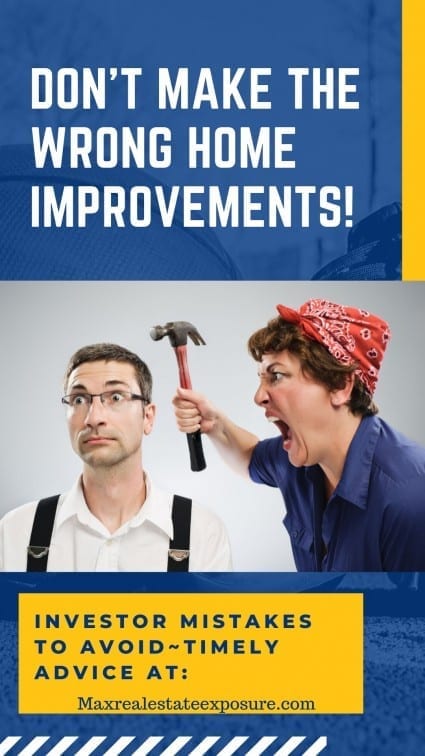Common Mistakes That New Real Estate Investors Make
 Becoming a real estate investor is not as easy as it seems. In fact, it’s quite easy to make mistakes! If you are considering investing in real estate, you must do your homework and strive to adequately prepare yourself for what investing requires.
Becoming a real estate investor is not as easy as it seems. In fact, it’s quite easy to make mistakes! If you are considering investing in real estate, you must do your homework and strive to adequately prepare yourself for what investing requires.
While infomercials will tell you that investing in real estate is an easy way to make big bucks, the reality is that investing in real estate is plenty challenging and there is no guarantee you will make money – in fact; recklessness can lead to you losing money.
Many unseasoned real estate investors will lose a lot of money. That is why you need to plan very carefully and consult with the right people, including an experienced real estate agent before you commit to an investment deal.
Selling a home to a real estate investor offers many pros and cons to a homeowner. Investors should have a firm grasp of the thought process before pursuing properties vigorously.
Understanding how to sell your services will become one of the many crucial aspects of becoming a successful real estate investor. National companies like “We Buy Ugly Houses” have this down pat.
Whether you are planning on flipping houses, becoming a rental owner, or just interested in learning more about real estate investing, check out the following information so you can avoid many of the most common mistakes new real estate investors make.
1. Not planning carefully.
When you are in the financial position to do it, buying a property as an investment can seem like a great idea. You spot a deal; you might as well jump on it, right? Not exactly. Real estate investing professionals are insistent on the fact that proper planning always proceeds a purchase, not the other way around. Hurrying into a home purchase can lead to big problems down the road.
Many new investors want to buy a property and then figure out what to do with it. You should do the opposite. Come up with your investment strategy first, then buy properties that fit that strategy.
Buying mistakes happen far more frequently in hot seller’s markets where properties are selling very quickly. Don’t get caught up in the hoopla.
2. Failing to build a sound investment team.
Real estate investing is not something that you do solo. It takes a group of professionals to navigate the incredibly complex world of real estate investing – including at least one experienced Realtor, a home inspector, and a mortgage lender. Picking these people will a vital part of your success. You need all these people because each is (or should be) an expert in their respective fields. They are all required when you want to start making real estate deals and do so in an informed and intelligent manner.
If you are planning on remodeling and/or renting properties, you will also need a team that can take care of all the many tasks that such efforts involve – like a painter, an electrician, a plumber, a roofer, a flooring installer, a cleaning service, an HVAC technician, a lawn maintenance team, and a general handyman.
If the real estate agent you choose to use has been representing investors, they will undoubtedly be able to offer advice on picking contractors.
While you may be able to do some of the tasks these people would help with, you cannot do all of them. And if you are seriously getting into investing, you are not going to have time to do the rehab and repair work on your own.
3. Not learning enough about real estate investing.
 Real estate investing is complicated. It involves a lot of moving parts. It is regulated by strict laws and regulations. You have to do your homework to understand things sufficiently to make informed decisions.
Real estate investing is complicated. It involves a lot of moving parts. It is regulated by strict laws and regulations. You have to do your homework to understand things sufficiently to make informed decisions.
It will take years of reading, studying, and practical experience to master real estate investing.
You do not have to be a master to start investing, but you should have a plan to educate yourself thoroughly over time. And you should most definitely start doing your homework now before you spend any money so that you can make the kind of smart decisions that will increase your odds of success.
4. Not understanding the local real estate market.
Have you heard the saying “all real estate is local”? When it comes to being a real estate investor, this statement couldn’t be more spot on. As a real estate investor, you need to understand the land value, home values, inventory levels, absorption rate, and the average days on market of properties for sale.
All of these data points help determine whether it will be a prudent move to purchase a particular property.
4. Not understanding cash flow.
One of the significant challenges of owning rental properties is maintaining enough cash flow to keep up with maintenance and repair needs. A rental property is going to require maintenance and repairs from time to time, and since you are the owner, you will be the one to pay for all of it. That means you need enough money to address emergencies when they happen.
You also need to think carefully about who will be managing your property or properties. You may assume that you can just hire a property manager, but many property management companies will not jump at the chance to manage a single home or condo.
The financial benefits for them are not high enough to justify the extra work for a single property. If they do want to manage your property, they may take up to 12 percent or more of your rental income – money that you probably need to cover maintenance and the mortgage.
Rentals may sit vacant for months at a time as well, which are months that you will have to pay the mortgage and the insurance and all the other costs that you usually have the renters pay for.
On the other hand, if you are fixing and flipping multiple properties, it is essential not to get in over your head financially. You’ll probably have mortgage loans to pay unless you are in the fortunate position of paying cash. Like anything else, being an investor is a business where cash flow has to be appropriately managed.
New investors have to keep in mind soft costs such as miscellaneous expenses, closing costs, real estate commissions, and carrying costs can put a real dent in your bottom line if you’re not careful.
Without a doubt having a firm grasp of financing and essential mortgage lingo is necessary.
5. Not having multiple exit strategies.
You probably have a plan for your property – but do you have a plan B and a plan C? Often, a program will not work out the way you were expecting. If you do not have contingency plans, you can find yourself stuck with a property and not have a way to fix your situation.
For example, maybe you plan to fix up and flip a home. But what if that does not work out as expected? Perhaps it would be better to rent the house instead until your goals can be realized?
6. Assuming that real estate investing will make you wealthy quickly.
 Real estate investing tends to be a long-term wealth-building strategy, in spite of what you may have heard from house flipping infomercials. That is not to say that you cannot get lucky and flip a home for a big profit, but you should be more realistic in your expectations.
Real estate investing tends to be a long-term wealth-building strategy, in spite of what you may have heard from house flipping infomercials. That is not to say that you cannot get lucky and flip a home for a big profit, but you should be more realistic in your expectations.
You will probably need to put in a lot of time, money, and effort before you start to see significant returns from your real estate investments.
7. Spending too much on an investment.
Many real estate investments do not turn a profit. Why? Because the properties are purchased for too high a price. Once you have handed the money over for a property, you are locked into a situation where your financial outlay is constant.
Whatever happens with the market – which could not be in your favor – the price you paid is the price you paid. All the hard work in the world after the fact won’t change the situation.
Before you buy a property as an investment, consult with the right professionals – like your real estate agent – and do as much research as you need to do to feel relatively confident in your decision. Even with all your research, you still may pay too much, but it is less likely that you will do so.
8. Failing to do your due diligence.
There is typically a feeling of tension when you are trying to find and close a real estate deal. You often need to move quickly to get a property when the time is right, which can make it easy to tell yourself that you don’t need to do your due diligence before a house purchase. But you do. You absolutely need to do your due diligence. Otherwise, you could wind up with a property that sucks away your money and leaves you with nothing to show for it.
What you may find is that it wasn’t even the house that did you in but something surrounding the property or other nuisance. Research is always vital when buying an investment property.
9. Not thinking big enough.
The real money in real estate investing comes with volume. Doing a single deal at a time – while often necessary at the beginning – is not the way to make it big. You need to have an ongoing process of finding deals, making purchases, and selling as appropriate. You have to start somewhere, but remember that to be genuinely successful means you will need to expand your enterprise over time.
10. Buying in the wrong area.
One of the biggest mistakes investors make is buying a house in the wrong area. This goes back to the all real estate is local premise mentioned above. There are always going to be some cities or towns where you can sell real estate with ease. One the other hand, there will be towns that are less desirable and always a harder sell.
Things like crime rate, the quality of schools, highway access, and local attractions such as restaurants/shopping can have a significant impact on the salability of real estate. Again, an exceptional real estate agent can provide you with the information you’ll need to make the best buying decision.
11. Making the wrong improvements.
 When you are purchasing a home with the intention of fixing and flipping it, the improvements you make will have a critical impact. In fact, how you go about renovating a home can make or break your success. Where you put your money becomes vital.
When you are purchasing a home with the intention of fixing and flipping it, the improvements you make will have a critical impact. In fact, how you go about renovating a home can make or break your success. Where you put your money becomes vital.
What improvements should be made and how much should be invested in each component. You certainly don’t want to make home improvements with a low return on investment.
These will be the kind of questions that will need to be answered:
- Do you go with a modest kitchen or something high end?
- Are the baths a full gut or something more cosmetic in nature?
- What color scheme should the house be painted in?
- Does flooring need to be replaced?
- Should the heating system be replaced or can I get by with what’s there?
- What are the major structural repairs that need to be tackled?
- Do I need to make any structural floor plan adjustments to make the home more saleable?
- What improvements should be made to the exterior and landscaping?
12. Choosing the wrong real estate agent.
Picking the wrong real estate agent really can lead to all of the above mistakes. An outstanding real estate agent will help you avoid many of the problems mentioned. Like lots of other folks, many real estate investors don’t take the time to vet the real estate agent they pick.
When becoming a real estate investor who has a long term investment horizon, common sense should tell you that your real estate agent should match that goal. Knowing how to pick a Realtor is essential.
Real Estate agents are a dime a dozen. Most people know multiple real estate agents. Do you know why that’s the case? It’s far too easy to get a real estate license. That means one thing – the odds of picking a lousy real estate agent are pretty high.
When you are an investor selling multiple properties, you can take that chance. A real estate investor should be seeking out someone who has been in the business for a while and has an exceptional track record of success. Ask yourself why you would want to settle for anything less? Investors should conduct a full real estate interview process before deciding on an agent.
While selling an investment property is no different than a traditional sale, the whole analysis of whether to purchase a property or not is something a skilled real estate agent should be assisting with.
Purchasing the wrong property will be the biggest mistake of all.
13. General Home Selling Mistakes
When you have never sold a home before it is quite easy to make mistakes. The key to a successful home sale is knowing and avoiding them. The most common home seller mistakes are as follows:
- Pricing a home incorrectly.
- Not preparing the home for the market properly.
- Not hiring the right real estate agent.
- Having a lack of proper real estate marketing both online and off.
- Letting your real estate agent practice dual agency, no longer representing your best interests.
- Thinking that open houses are a vital part of real estate marketing.
- Selling your home before you are truly ready.
- Not disclosing important information about the property.
- Failing to be flexible with showing the house.
- Thinking that the listing agent should be at the showing (accompanied showings).
- Being inflexible during negotiations.
Final thoughts
Being a great real estate investor comes with time and experience. Without a doubt, you will learn new things along the way. Take the process slow and always do your research. Never make hasty decisions and always consult with other pros when you need the advice.
Other Helpful Real Estate Resources
- What to think about before downsizing – learn some of the most important factors to consider before you move to a smaller house.
- What to know about purchasing a vacation home as an investment – get some valuable information on what you need to know about buying a vacation investment property.
- Picking a buyer’s rep – when you are purchasing a home, especially for the first time, it is vital to have a top-notch buyer’s agent in your corner. See some great tips on finding one.
- What do you need when applying for a mortgage – see the essential documents that a lender will require when they are going to grant you a loan.
Use these additional real estate articles to educate yourself when you’re purchasing a home.
About the author: The above Real Estate information on mistakes real estate investors make was provided by Bill Gassett, a Nationally recognized leader in his field. Bill can be reached via email at billgassett@remaxexec.com or by phone at 508-625-0191. Bill has helped people move in and out of many Metrowest towns for the last 33+ years.
Are you thinking of selling your home? I have a passion for Real Estate and love to share my marketing expertise!
I service Real Estate sales in the following Metrowest MA towns: Ashland, Bellingham, Douglas, Framingham, Franklin, Grafton, Holliston, Hopkinton, Hopedale, Medway, Mendon, Milford, Millbury, Millville, Natick, Northborough, Northbridge, Shrewsbury, Southborough, Sutton, Wayland, Westborough, Whitinsville, Worcester, Upton and Uxbridge MA.
Thank You Bill for sharing this informative post. It was a great read. And I think this blog post will help everyone who’s into real estate investment. Keep sharing such articles.